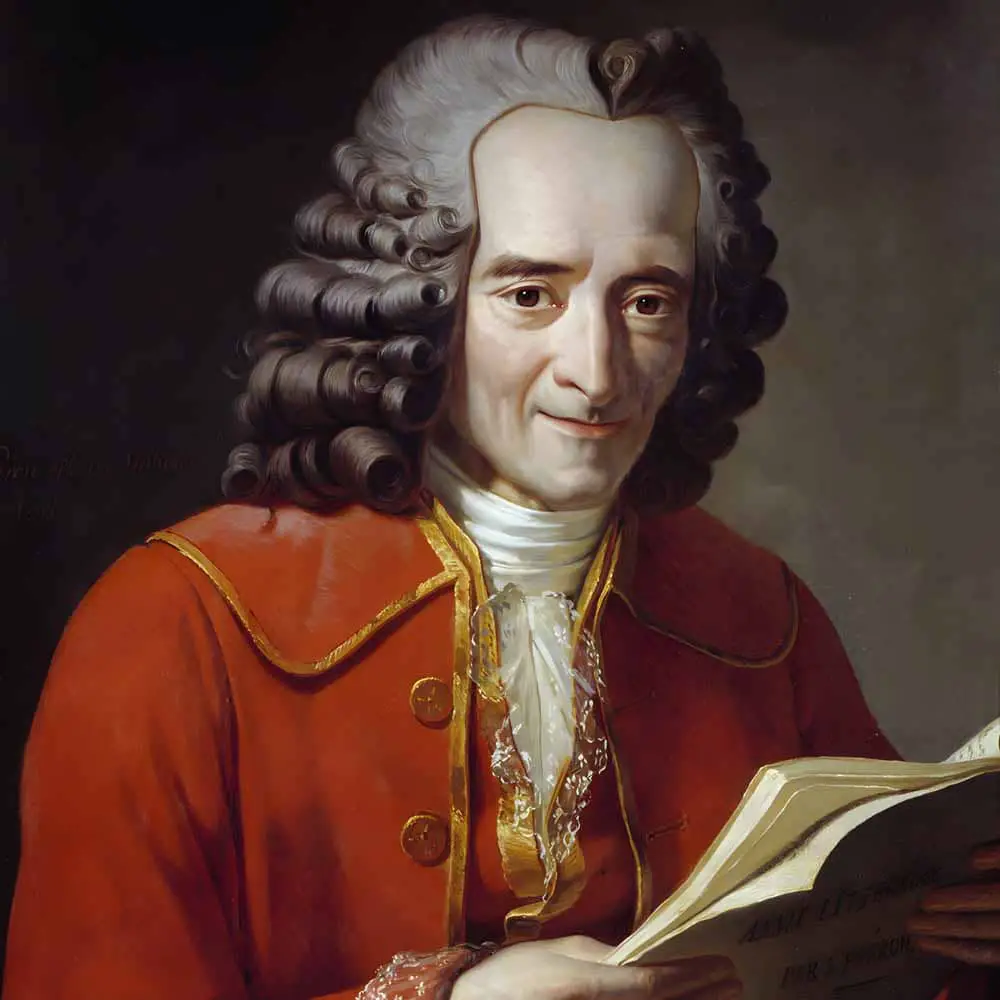
Voltaire: Enlightenment and Influence in Modern Thought
Voltaire, born François-Marie Arouet in 1694, was a French Enlightenment writer, historian, and philosopher known for his wit, his criticism of Christianity, especially the Roman Catholic Church, as well as his advocacy of freedom of speech, freedom of religion, and separation of church and state. He was a prolific writer, producing works in almost every literary form, including plays, poems, novels, essays, and historical and scientific works. More than 2,000 books and pamphlets and his correspondence of over 20,000 letters depict his legacy as a key figure in shaping the principles of the modern world.
With his sharp pen, Voltaire was a staunch critic of societal and religious dogmatism, challenging the status quo through his works. His most famous literary contributions include ‘Candide,’ which satirizes the philosophy of optimism propagated by Gottfried Wilhelm Leibniz, and ‘Letters Concerning the English Nation,’ which praises British political institutions and encourages their emulation in France. Despite facing censorship and imprisonment during his lifetime for his controversial views, Voltaire’s impact on philosophy and the fight for civil liberties persists to this day.
Voltaire’s influence extended beyond literature and philosophy into the realms of advocacy for civil rights and social reform. His sustained campaign for justice in the case of Jean Calas, a Protestant falsely accused of murdering his son, stands as testimony to his commitment to legal reform and opposition to religious discrimination. He became an emblematic figure of the Enlightenment, embodying its ideals of critical thinking and rationality over superstition and intolerance, values that continue to resonate in contemporary discourse.
1. Early Life and Background
François-Marie Arouet, later known as Voltaire, was a prominent writer and philosopher in France. His early life set the foundation for his future as a sharp-witted poet and satirist, marked by a rigorous education and conflicts with authority that would lead to imprisonment and exile.
1.1. Birth and Family
Born on November 21, 1694, in Paris, France, Voltaire was the youngest of five children to François Arouet, a well-established lawyer, and Marie Marguerite Daumard, a noble family’s daughter. Despite the loss of his mother when he was just seven, Voltaire’s family background provided a blend of legal acumen and noble connections.
1.2. Education at Louis-le-Grand
From 1704 to 1711, Voltaire attended the Jesuit college of Louis-le-Grand, where he received a classical education, excelling in Latin and Greek. The rigorous curriculum imbued young Arouet with a solid grounding in literature and science, while the exposure to Jesuit rhetoric shaped his skill in argumentation and satire.
1.3. Bastille and Exile
In 1717, after penning a series of satirical verses about the regency and Louis XIV, Voltaire was sentenced to eleven months in the Bastille. This period in confinement was pivotal; he began his play “Œdipe” and adopted the pen name ‘Voltaire.’ Upon release, continuous conflicts with French nobility led to his exile in 1726. Voltaire took refuge in England, where he remained until 1729, profoundly influencing his philosophy and literary output.
2. Literary Works and Philosophy
Voltaire’s legacy in literature and philosophy is marked by his prolific output in various genres, including novels, plays, poems, and essays. His works often intertwined satirical wit with philosophical inquiry, challenging the status quo and shaping Enlightenment thought.
2.1. Candide and Other Notable Works
Voltaire’s novella Candide stands as a paramount example of his literary prowess and philosophical satire. Considered by many as his magnum opus, the work follows its optimistic protagonist through a series of calamities, cleverly criticizing naive optimism and exploring themes of freedom and human suffering. Other significant works that demonstrate Voltaire’s eclectic writing style and dexterity include Micromégas, an early work of science fiction with philosophical overtones, and Zadig, which employs a narrative full of moral and metaphysical puzzles.
- Tragedies: Voltaire penned numerous tragedies, imbuing the genre with his distinctive philosophical perspective. Among these, his play Henriade is noteworthy, exploring religious tolerance and historic grandeur through the prism of epic poetry.
- Philosophical Treatises: His Dictionnaire Philosophique (Philosophical Dictionary), a compendium of essays, epitomizes his critical thinking. It touches on an array of subjects from theology to government, etching in stone his identity as a ‘philosophe’.
- Contes: Voltaire’s ‘contes’ (tales) merge narrative with philosophical insight, illustrating his versatility and the breadth of his intellect.
2.2. Historical Documentation
Voltaire was also a dedicated historian, producing detailed Histories that captured the sociopolitical landscapes of his time. His historical work is characterized by an untraditional approach, combining factual recounting with philosophical reasoning to provide deeper insights into the events.
- “The Age of Louis XIV”: He retells the grandeur of the Sun King’s reign.
- “Essay on the Customs and the Spirit of the Nations”: Voltaire tracks the progress of civilization up to his own time, emphasizing cultural and intellectual history over the more common military or political chronicles.
2.3. Letters and Essays
In addition to his literature and philosophic endeavors, Voltaire was a prolific letter writer. His Letters conveyed not only personal sentiments but were also a vehicle for disseminating his philosophical ideas.
- Philosophical Correspondence: His letters to other Enlightenment figures were insightful exchanges about the philosophical and social topics of his day.
- Essays: Voltaire’s essays frequently dissected societal norms with a blend of sharp wit and critical analysis, making substantial contributions to Enlightenment thought and modern philosophy.
Voltaire’s literary and philosophical contributions remain foundational, reflecting his deep engagement with the human condition and his relentless pursuit of truth through reason and satire.
3. Influences and Contemporaries
Voltaire was deeply influenced by his time in England, where he encountered the ideas of notable English thinkers. His correspondences with prominent figures of his era further reflect his intellectual connections and the exchange of ideas across various disciplines.
3.1. Exiled to England
Voltaire’s exile to England (1726-1729) played a significant role in shaping his philosophical outlook. During this period, he became intimately acquainted with the works of John Locke and Isaac Newton, which influenced his appreciation for empiricism and rational thought. The English emphasis on reason and science resonated with Voltaire, contrasting with the French institutions that often intertwined philosophy with religion and the state. His literary style was also impacted by English writers, and he was particularly drawn to the satirical works of Alexander Pope.
- Key English Influences on Voltaire:
- John Locke: Philosophy, empiricism, government.
- Isaac Newton: Science, rationalism, Enlightenment ideals.
- Alexander Pope: Literary style, satirical prose.
3.2. Correspondence with Notables
Voltaire maintained a vigorous correspondence with influential philosophers, scientists, and writers throughout his life. These letters shed light on the exchange of ideas that Voltaire had with both English and French contemporaries. He frequently engaged in discussions on philosophy, science, and the role of the writer and philosopher in society. His correspondents included prominent figures who shaped the intellectual landscape of the time, such as monarchs, fellow writers, and other thinkers.
- Noteworthy Correspondence Partners of Voltaire:
- Philosophers: Discussions on reason, state, and philosophy.
- Scientists: Exchanges on the natural sciences, reflecting his interest in Newtonian physics.
- Writers: Dialogues with fellow writers about literature and its impact on society.
4. Voltaire’s Impact on Society
Voltaire, a leading figure of the Enlightenment, profoundly influenced societal values, challenging established norms with his fervent support for freedom, tolerance, and reason. His criticisms resonated through the centuries, shaping modern Western thought and political landscapes.
4.1. Advocacy for Freedom and Tolerance
Voltaire staunchly advocated for the principles of freedom and tolerance. His writings championed the cause of religious toleration, which contrasted sharply with the era’s prevalent religious persecution. He famously argued for the freedom of thought and expression in his essay, “Treatise on Tolerance,” as a necessary condition for societal progress and enlightenment.
- Enlightenment Values: Promoted the use of reason and individual rights.
- Religious Toleration: Stood against the Catholic Church’s intolerance.
- Expression: Insisted on the freedom of speech as a fundamental human liberty.
4.2. Criticism of Church and State
Voltaire’s critiques targeted the entwined powers of the Church and the Monarchy, which he viewed as impediments to societal evolution. His sharp satire, aimed at the French court and the Catholic Church, underscored his disapproval of their authoritarian rule and the manipulation of religious belief for political ends. He used wit and irony as tools to undermine the credibility of oppressive institutions, fostering a spirit of critical inquiry and skepticism.
- Church: Attacked superstition and dogmatic religion.
- State: Denounced autocracy and the Monarchy’s abuse of power.
- Philosophy and Politics: Influenced the separation of Church and State in political thought.
5. Voltaire Personal Trials and Tribulations
Voltaire faced significant adversity throughout his life, which included clashes with authorities and challenges in his personal relationships. These experiences had a profound impact on his works and philosophies.
5.1. Clashes with Authorities
Voltaire, born François-Marie Arouet, often found himself at odds with the French authorities. He utilized the anagram of his surname, Arouet, to write under the pseudonym ‘Voltaire.’ A notorious scandal involving the Chevalier de Rohan led to Voltaire’s imprisonment in the Bastille for nearly a year. This quarrel stemmed from Voltaire’s sharp wit and refusal to be belittled by nobility. Post-release, he adopted his pen name permanently.
- Exile: Voltaire’s numerous conflicts with the French court forced him into exile multiple times. His critiques of the government were viewed as subversive, leading to his departure from France.
- England (1726-1729): His stay here influenced his later work, the Henriade.
- Prussia (1750-1753): He built a tumultuous relationship with Frederick the Great but eventually left after numerous disputes.
- Geneva and Ferney: He spent his later years between these two cities, where he continued his work as a philosophe while enjoying more freedom than in France.
- Château de Cirey: Voltaire and Émilie du Châtelet, his long-time companion and intellectual partner, resided here. This home became an intellectual hub for Enlightenment thinkers.
5.2. Relationships and Private Life
- Émilie du Châtelet: She was a mathematician and physicist whose relationship with Voltaire lasted over 15 years until her untimely death. Their partnership was both romantic and scholarly, and they collaborated on various scientific and philosophical works.
- Their time in Champagne at the Château de Cirey was both prolific and intellectually stimulating, although it was not without its challenges.
- Ferney: Later in life, Voltaire settled in Ferney, where he focused on his writing and became a leading figure of the Enlightenment. His residence there is now known as Voltaire’s Château de Ferney.
- Condensed Works: Despite personal hardships, Voltaire managed to produce a condensed yet prolific array of works that encapsulated his philosophies and experiences.
6. Legacy and Memory
Voltaire’s impact on culture and education has been profound, with his works remaining central to discussions of Enlightenment values. He is commemorated as a key figure advocating liberty and progress in a transformative historical period.
6.1. Posthumous Reputation
Year of Death: 1778
Philosopher Status: Renowned
Literary Contributions: Prolific writer (over 2,000 books and pamphlets)
Upon his death, Voltaire’s reputation as a philosopher, historian, and writer escalated, particularly in the context of the Enlightenment which he actively shaped. His work came to be associated with criticism of the French monarchy and the Catholic Church, especially during the reign of Louis XV, whom he both served and challenged.
Although suppressed at times, his philosophies gained traction among thinkers and reformists, bolstering his posthumous reputation as a champion of civil liberties, freedom of religion, and free trade.
6.2. Cultural and Educational Influence
Fields Influenced: Literature, History, Culture, Education
Voltaire’s influence is evident in educational curriculums, primarily through his literary works, which offer insights into 18th-century Europe and the historical context of the Enlightenment. His sharp wit and style made him a significant French author, leaving a lasting imprint on French literature.
In culture, his ideas promoted a spirit of critical inquiry and skepticism that fueled intellectual and cultural pursuits. His advocacy for progress inspired future generations to challenge societal norms and set the foundation for a more secular, progressive society.




